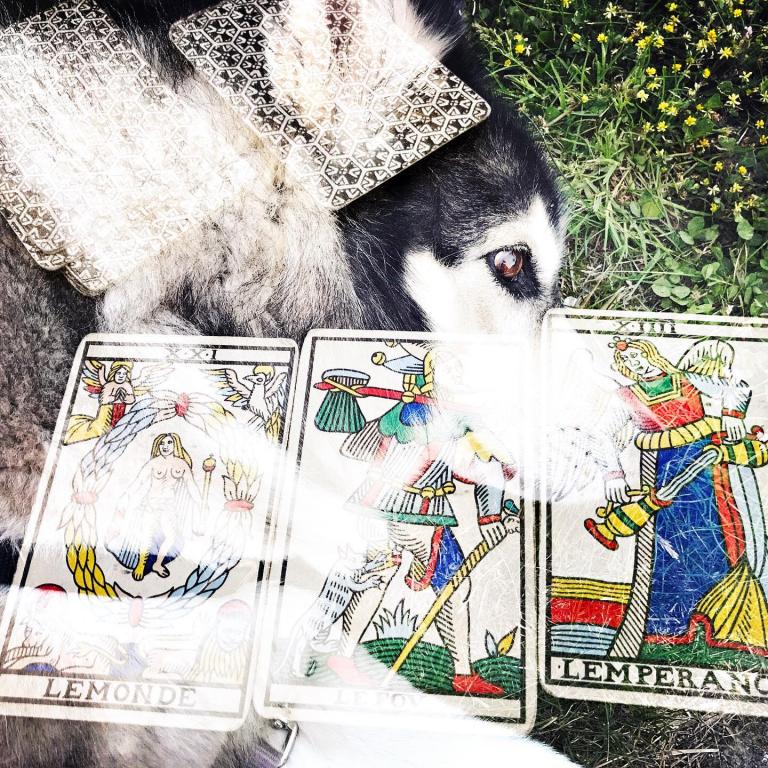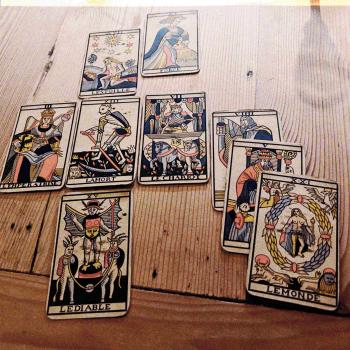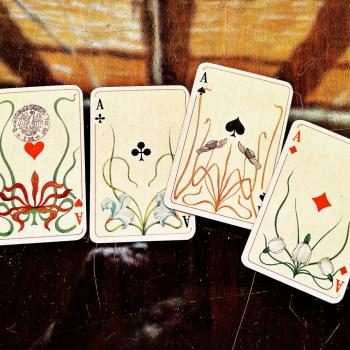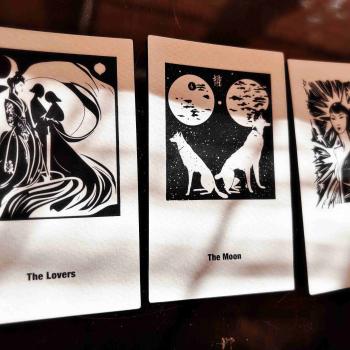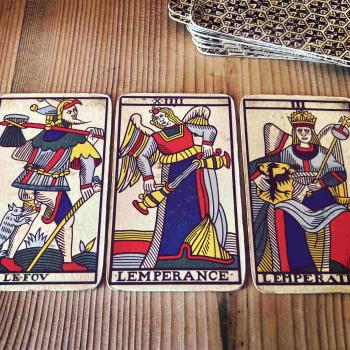I took a walk with the dog last night. It was midnight and very hot. The neighbor was out in her garden. As I passed her house, she stopped me to congratulate me on the recent purchase of a house. She knows where it is: ‘It’s a wild place, right there by the ocean. Strong winds too. And big.’ ‘Yes, I said. Just the thing itself. As to the size, I have plans for it: there’s a gallery space, a teaching space, and a Zen space that will perform excellently in accordance with my work.’ ‘It’s good to have dreams,’ she said.
Her remark threw me aback. ‘Dreams? Who’s talking about dreams?’ I almost had a visceral reaction towards what I took to be the woman’s rather puerile response to my describing my ambition with the house — with both us being in our 50s, and with me knowing exactly which space can perform what function. The space exists as such, and I’m the boss of orchestrating my Cards and Zen work, Darkroom Photography, and calligraphy around it.
I wanted to say, ‘I don’t have any dreams, simply because that would presuppose being somewhere else in my head than in the world right before me. And I prefer presence to the imagination.’
It occurred to me that this response would have been the opposite of much of the ‘motivational speech’ that so many of us get bombarded with on a daily basis, which is basically a manifestation of a complaint against life wrapped up in a falsely erect posture and smile.
‘It’s good to have dreams, and how lucky that you’re awesome. You can do anything’.
I’m sure I can.
The immature
I’m thinking about all the immature people I encounter on a daily basis. Their idea of going through life is by clinging to their attachment to puberty and its hysteria: ‘You’ve ruined my life. It’s not fair,’ young people say, when you prohibit them from going to the movies. I’m glad I have no children, as I find that I have a hard time tolerating this sense of righteousness and entitlement. The ones who have to deal with this on a daily basis have my sincere sympathy.
It gets worse, however, when this attitude is carried over into older age. That’s when we start encountering assailment from top level government to our nearest online marketer. It’s a known fact that Trump complains all the time, as he probably did when he was five. It’s also a known fact that when ‘life prophets’ hit you with the truism, ‘life is hard,’ they also promise you solutions to your struggles by restoring your mission and re-calibrating your tasks. My jaw is dropping. This is some serious monkey business.

I see a relation between this type of immaturity and the call to turn ‘inwards’ that the motivational talk based on platitudes transacts with. The immature person, who now sounds like a guru, is often very upfront: ‘Oh, for Christ’s sake, let’s talk about the past. I’ll start with mine as it’s so inspirational’. Although presented as ‘acceptance,’ the real premise is one of revolt against the state of things, appealing to ‘the relatable.’ Then there’s the sense of ‘justice.’ No one is more righteous than a toddler.
What gets me going is the presumptuousness that people actually have time for ‘personal stories’ that are meant to ‘inspire’ you: ‘I was miserable once because such and such. But today, oh, today I figured it out, and I’m ready to tell you all about it. It’s a secret, of course, but I don’t mind sharing it with my ever growing newsletter list’ [insert number of people]. Even photographers use this trick, the latest in my inbox being the invitation that I join over one million people who’re interested in learning the secret to digital photography AND life — the promise being that if you KNOW life, which this photographer claims is the case in his case, then you’ll also know how to take pictures [insert here the promise to teach you by referring to past life general mistakes].
Honest to God. What a liberating thing to not believe in any god, let alone THAT god, aka the god of consumerism. I’ll go pray to some mature folk, some monks, as they tend to ‘grow’ differently. As a Zen oriented person, the past is the last thing I want to invest my time in. Other people’s past is even less interesting to me. I have zero interest in past experiences, as I have zero interest in dreams. If I need motivation or inspiration, I prefer to read some good poetry, or be spanked by a master whose skills at a specific thing are downright frightening.
I get it, though. Relatability is a seductive weapon, as it operates with an inherent promise. It starts with the words: ‘Trust me, life is hard [insert here vigorous nodding at the receiving end of this breaking news]. Then the reassuring line: ‘I did it, and so can you, as I’m sure you can relate [insert here excitement about the possibility to ‘grow’].
A thought
If I must offer a thought at all, not merely an opinion but A THOUGHT, let me say the following: growing up before you grow into anything is a good idea. It’s an illusion to think that you can actually learn from past experiences, yours and the ones shared with you alike. Actual learning that has real transformative power can only occur on the basis of what you internalize about your own flow right as it happens, when you realize that you’re singular in your experience of life, and that this singularity has zero to do with any hypocrisy, the idea of ‘inspiring community’ being one such.
Just think about this cultural fad: there’s no end to the proliferation of podcasts and interview series featuring people talking about themselves. But who are we? Who appoints us to expert-hood? I’ve been on a few podcasts myself, and I can testify that I had a very distinct feeling that, indeed, all I was doing was talk about myself, addressing strangers. Did my talk have any purpose beyond ‘expressing the self,’ with the entertaining value added? I’m not sure I can answer this in any reasonable way. When that is said, the fact that we can share information is a wonderful thing, but here I want to ask: Is ‘the past’ or ‘dramatic life events that you can learn from’ also information? How do I process another person’s misfortune, courage, or heroism so it becomes significant knowledge for myself? Is that even possible, or is it an exercise in wasting time?
The main line of the shallow thinkers cast as motivational speakers is to say the following: ‘you can step up to it just the way you are, and you’ll inspire a zillion others with your story. After all, it’s your life story and if you feel like sharing it, then just do it. You don’t need anyone’s approval for it.’
Whoa. Drum rolls. The coin just dropped. How inspiring, no?
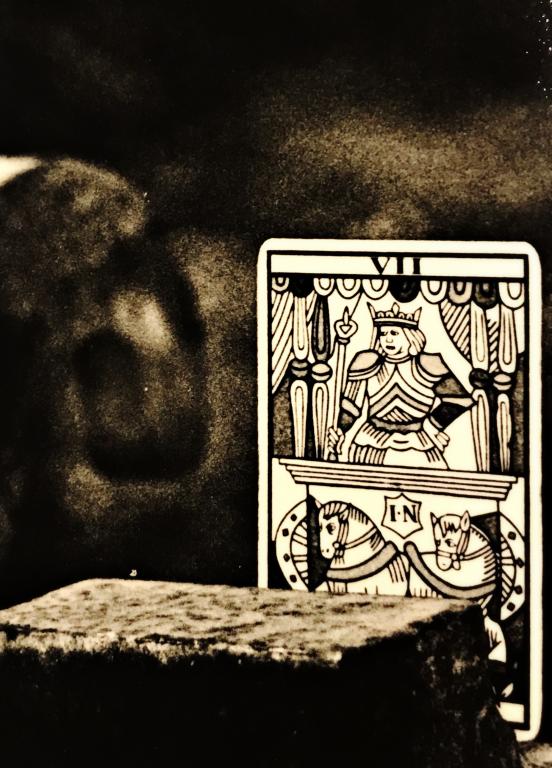
I think of what happens when I forget to consider my own time in the face of others always assuming that I must have plenty to spare. What do I see when I disregard my time, and start clicking here and there? Discernment and reflection are not in focus. What’s in focus is the self in all its power to identify with whatever is in vogue. It’s the collective 3-year old tantrum asking for ‘healing’ at the supermarket. It’s the puberty age we’re all called upon to ‘acknowledge,’ ‘respect,’ and heed attention to. How lamentable. And yet, I cannot complain about it anymore than I can complain about death, yet still again, I sure lament this situation…
As far as I’m concerned, if I were to ‘heal’ the past by trying to understand what was happening to me at the time, forget and forgive [insert here the popular idea that it’s yourself, thank you, that you need to forgive first, because otherwise you can’t love yourself, and that’s bad], I would most definitely not live my life in the now, as I’d be too busy with trauma, the pain in the soul, my teenage vulnerability, and other such misfortune that I’ve had a hard time growing up with, or growing out of.
The same goes for the future. How can I dream it up? ‘This is how I went from rags to riches,’ people say, offering their stories of success. ‘It’s good to have dreams’ the neighbour said, even when presented with a matter of fact.
What dream? Who’s dreaming it? What’s the purpose of this dreaming? And now that I’m at it, I might as well ask: while dreaming, what’s happening to my life? Can I even know it? Maybe ‘the universe knows it,’ but is that enough? It’s funny how the deep universe has a way of instilling very shallow thinking in us.
Who’s complaining? How do you hear this line [insert here ‘sales pitch’]: ‘Life is hard. Here’s a life lesson based on a shared past experience that has nothing to do with your own present moment. But indulge me, give me your attention, as I’m sure you don’t want to miss my inspirational story’. There isn’t even a ‘please’ in this ambush and invasion of my time and space. People say, ‘scroll on by’ or ‘unsubscribe if you don’t like what I say,’ but why do I have to do that to begin with? What happened to basic decency? Since when it’s about managing my ‘likes and dislikes’? As you can hear, at this point I’m complaining unapologetically. How vexing…
No, thanks
Here’s what I say today. Next time someone wastes your time with platitudes and grand claims, shift into your ‘no, thanks’ mode. Think about how much time you have for stories; stories of 7-figure successes that are not even backed up by evidence. If the 7-figure is so important, can we see a bank statement about it, so we know it’s true? What would you do without these ‘empowerments’ and ‘endorsements’ forced upon you [insert here the line, ‘my calendar is booked up, but I’ll make a special effort to accommodate you’]. Think about what stares you in the face: not the past, not the future, not a dream, and not a complaint against life dressed up in fancy clothes, the implicit being that ‘if you show me yours, I’ll show you mine.’
Try dismissing the ‘motivational’ and the ‘inspirational’ for a week, and pay attention to how the magic of your life such as it is unfolds. Put your cartomancy cards to work, and ask a serious question.
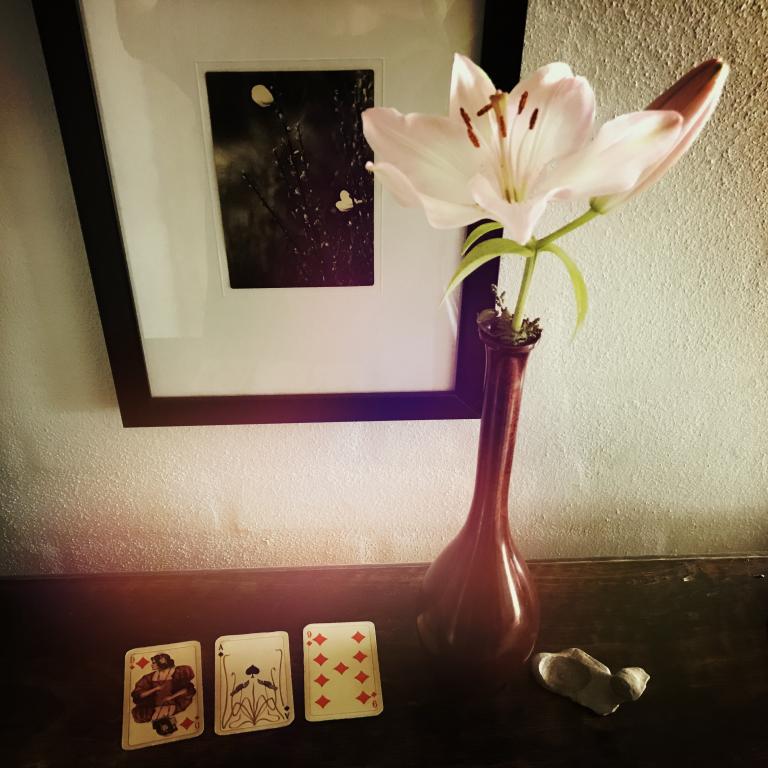
Or try asking a whole series of questions, especially if you find yourself put on the spot here, mistaking the essential for what is nothing but the expression of shallow thinking.
How do I step into my maturity? How does my maturity manifest? Where does my need for other people’s story come from, and how mature is this need actually? How do I figure out what ‘myself’ is?
If you feel adventurous, you may want to ask the cards about the propensity for your thinking: how deep is your thinking? How shallow is it? If your thinking is shallow, ask the cards about how you can deepen and strengthen it and about how you can cultivate the art of distinction so you can exercise it powerfully. As an example, you may think about how prone you are to fall for adjectival modifications: ‘you’re not just an empath. You’re a strong empath’. That sort of thing. And what’s an empath, again? Think about the real premise for your relatability, if you ever find such shallow assumptions about your being an empath relatable or ‘inspiring’.
Lastly here, in my attempt to raise the educational level of how you may consider growing up through your adult age, for further study into the nature of complaint and the necessity to think about its immature roots — which, again, in my own view takes the form of ‘motivational speech’ — you may want to read professor Avital Ronell’s fascinating work, Complaint: Grievance among Friends (2018). It will give you something to think about that’s a lot more entertaining than the daily emails you get from well-intended tantrum throwers, telling you all about what you are and how you are, as if certitude itself were located precisely between their kindergarten fingers.
*
For a sustained practice with the cards:
- Join the Read like the Devil Club.
- Visit also Aradia Academy and sign up for the newsletter that will keep you informed on upcoming courses and cartomantic activities. Note the Off the Shelf offering that also includes free resources.
- Check out my books on the philosophy and practice of divination at EyeCorner Press.
- Get a reading. When I perform a reading, I also teach, simply because I can’t help myself, so you will be twice served.

